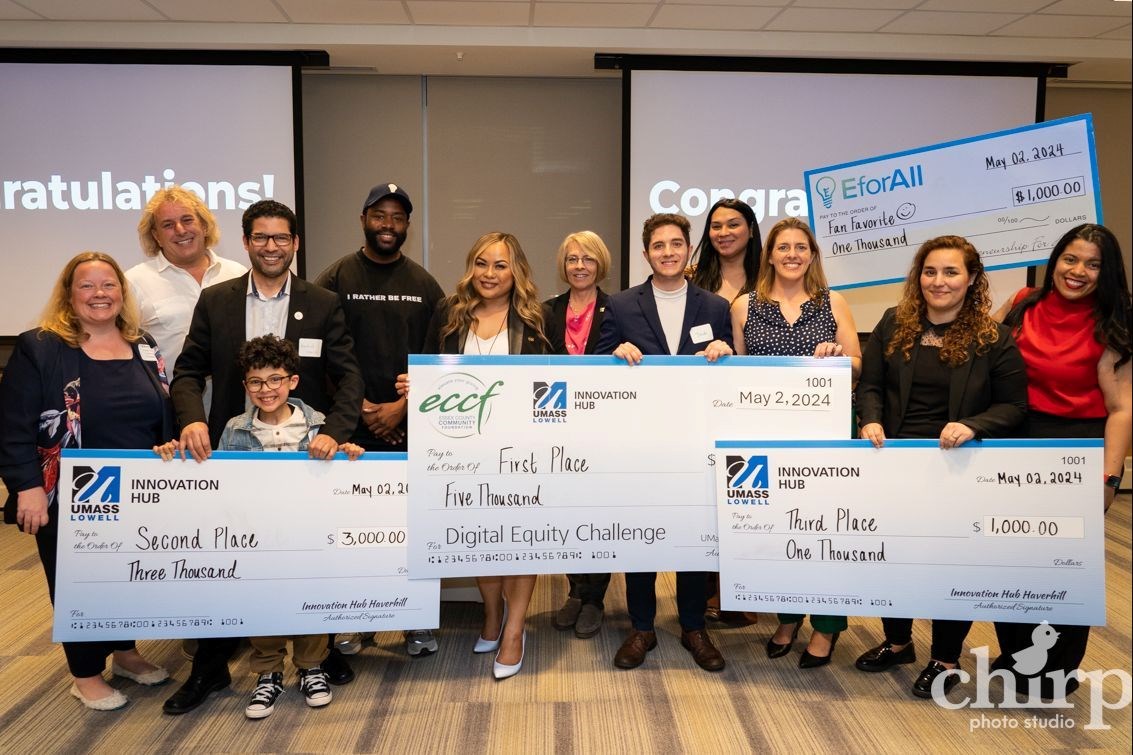Meet the winners of the Digital Equity Challenge
 Image by Chirp Studio
Image by Chirp Studio
The winners of the Digital Equity Challenge celebrate with event judges and organizers.
05/09/2024
By Stephanie Guyotte
The UMass Lowell Innovation Hub Haverhill created the Digital Equity Challenge pitch contest to find community-based solutions that make it easier for people to access digital resources and opportunities.
Lawrence Community Works was awarded $5,000 for first place for a project to provide free, reliable Wi-Fi throughout its affordable housing project in Lawrence as well as provide a community advocate to help residents access Wi-Fi and Internet resources.
“LCW’s community programs are designed for maximum integration with residential life and to support an overarching goal of family economic mobility,” said Jacob Greer, Executive Assistant and Resource Developer at Lawrence Community Works. “No matter how someone may be connected to the LCW network, our goal is for them to access a diverse menu of supportive resources and offerings depending on their individualized situation and aspirations.”
The 3rd annual Digital Equity Challenge was held May 2 and hosted by the Innovation Hub Haverhill and the Essex County Community Foundation.
Five finalist teams presented their ideas to a panel of judges and a total of $10,000 in cash prizes was awarded. The event judges were: Tim Brown, Chief Innovation and Strategy Officer for Northeast ARC; Shantel Alix Fernandez, Director of Community Building for the North Shore Community Development Coalition; Stanley Rameau, Founder and CEO of Renavest; and Robin Toof, Co-Director of the Center for Community Research & Engagement at UMass Lowell.
Rachid Moukhabir of Methuen won second place for his proposal to expand his information technology training program, called Mass Association for Computer and Internet Resources (MACIR) Inc, to the Merrimack Valley. Moukhabir said his program helps underserved populations enter the IT workforce and provides support and further training to allow those workers to continue to grow in the industry.
Josefa Arriagada Saieh, a Mass Development fellow working in Lawrence, and Karina Calderon of the Lawrence Partnership presented a collaborative project to turn under-utilized alleyway in Lawrence into vibrant community space with free outdoor Wi-Fi access. They won third place as well as a prize as audience favorite.
Additional presenters were Minds With Purpose, a digital content creator and community builder, and Build Game Box, a Haverhill-based subscription box to teach digital game design and concepts to children and teens.
“Through the Digital Equity Challenge, we’ve encouraged the community to use entrepreneurial thinking to develop innovative solutions to the challenges of digital literacy, access and equity, and we’ve seen great results,” said Stephanie Guyotte, associate director of the Innovation Hub Haverhill. “This year’s projects – and the people behind them – are creative, and compelling. They are changemakers. They all want to make our communities better and build opportunities for others. That spirit is central to our work here at UMass Lowell and the Innovation Hub Haverhill. It was exciting to see them be rewarded for their pitches.”
Since 2022, the Digital Equity Challenge has awarded $30,000 to local, community digital equity projects and several past winners have received additional funding to scale and grow.
“To successfully close the digital divide in Essex County, we need solutions that are by, from and for the community,” said Kate Machet, director of strategic initiatives and government relations at Essex County Community Foundation. “That’s why the Digital Equity Challenge is so exciting. It attracts innovative entrepreneurs who not only have viable, well-thought-out plans to expand access to the Internet, devices and learning resources, but they also have an ear to the ground for what their communities truly need to make these connections sustainable.”
Along with the ECCF, challenge sponsors include UMass Lowell’s Rist DifferenceMaker Institute, Pentucket Bank and Entrepreneurship for All (EforAll), a nonprofit agency that assists underrepresented individuals in launching businesses.
“EforAll Merrimack Valley is happy to partner with the Innovation Hub for the third year for the Digital Equity Challenge,” said Sophan Smith, executive director of EforAll Merrimack Valley. “Digital literacy and equity are crucial in today’s interconnected world because it empowers people to navigate, understand, and effectively use digital technologies. From basic internet skills to more advanced abilities like critical thinking about online information, digital literacy enables people to participate fully in the digital age.”
